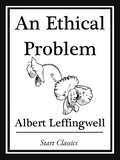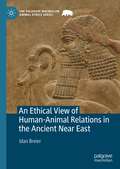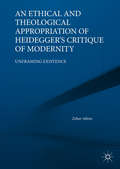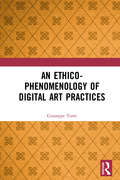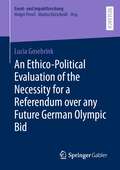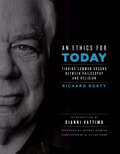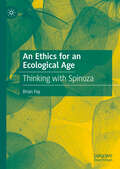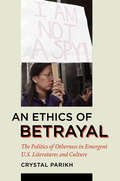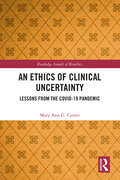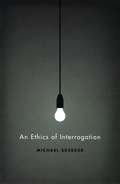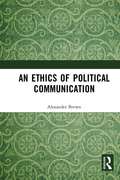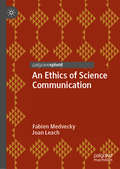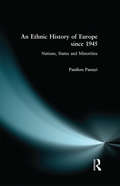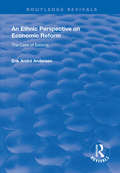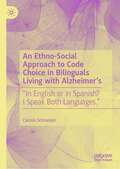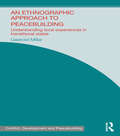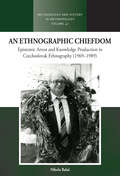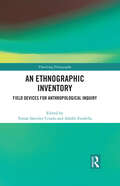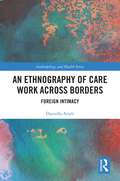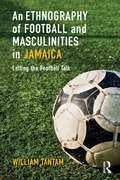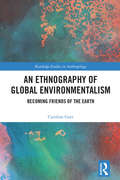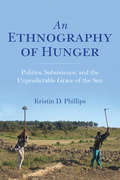- Table View
- List View
An Ethical Problem
by Albert LeffingwellWritten by physician and social reformer, Albert Leffingwell sheds light on the abusive experimentation on man and animals.
An Ethical View of Human-Animal Relations in the Ancient Near East (The Palgrave Macmillan Animal Ethics Series)
by Idan BreierExploring the earliest literary evidence for human-animal relations, this volume presents and analyzes biblical and Mesopotamian (Sumerian, Assyrian, and Babylonian) sources from the third millennium BCE through to the consolidation of the biblical literature in the first millennium BCE. Key Features:Provides the first comprehensive study of these texts from an ethical perspective.Examines proverbs, popular aphorisms, myths, epic literature, wisdom literature, historiography, prophecy, and law codes.Applies methodology from current contemporary biblical and ancient Near Eastern scholarship and human-animal ethics, thereby raising new questions that lead to fresh insights.An Ethical View of Human Animal-Relations in the Ancient Near East is essential reading for scholars and graduate students of animal ethics, applied ethics and biblical studies.
An Ethical and Theological Appropriation of Heidegger’s Critique of Modernity: Unframing Existence
by Zohar AtkinsThis book is at once a deeply learned and original reading of Heidegger and a primary text in its own right. It demonstrates the relevance of Heidegger’s thought in responding to the moral and religious challenges of 21st century existence. It shows that Heidegger’s project can be defended against many criticisms once its existential character is taken seriously. What emerges is a powerful exercise in thinking, not about Heidegger, but with and against him. As such, Atkins engages Heidegger as a means of advancing a defense of spirituality in the modern world that holds spirituality itself accountable for its lapses into the mundane. Addressing the most influential figures in recent Continental philosophy, such as Emmanuel Levinas and Theodor W. Adorno, this is a work that will be of timely use to philosophers, theologians, artists, and seekers.
An Ethico-Phenomenology of Digital Art Practices
by Giuseppe TorreDigital art practitioners work under the constant threat of a medium – the digital – that objectifies the self and depersonalises artistic identities. If digital technology is a pharmakon in that it can be either cure or poison, with regard to digital art practices the digital may have in fact worked as a placebo that has allowed us to push back the date in which the crisis between digital and art will be given serious thought. This book is hence concerned with an analysis of such a relationship and proposes their rethinking in terms of an ethico-phenomenological practice informed by an in-depth understanding of the digital medium. Giuseppe Torre engages with underground cultures such as Free and Libre Open Source Software (FLOSS) and its ties with art discourse. The discussion is informed by various philosophical discourses and media theories, with a focus on how such ideas connect back to the existing literature in performance studies. Replete with examples of artwork and practices, this book will be of great interest to students and scholars of theatre and performance studies, art and technology.
An Ethico-Political Evaluation of the Necessity for a Referendum over any Future German Olympic Bid (Event- und Impaktforschung)
by Lucia GosebrinkThe implementation of referenda in advance to an Olympic bid is common in Western democratic countries. In many cases, they have produced negative results, ending the aspiration of Olympic Games on the spot. Germany is no exception to this case. While recent research has predominantly investigated the possible reasons why past referenda have failed, the aim of this book is to evaluate the necessity of a referendum as a tool in the first place. Since a referendum is no formal requirement by the International Olympic Committee (IOC), its application is examined on an ethico-political level. Therefore, the advantages and disadvantages of a referendum in terms of any future German Olympic bid are analysed and discussed – from a political, civil and German Olympic Sports Confederation (DOSB) perspective. Based on the findings, this work rejects the necessity of a referendum before a German Olympic bid, as the alignment of ethico-political considerations analysed does not seem to be sufficiently pronounced in the de jure and de facto implementation of this tool.
An Ethics for Today: Finding Common Ground Between Philosophy and Religion
by Richard RortyRichard Rorty is famous, maybe even infamous, for his philosophical nonchalance. His groundbreaking work not only rejects all theories of truth but also dismisses modern epistemology and its preoccupation with knowledge and representation. At the same time, the celebrated pragmatist believed there could be no universally valid answers to moral questions, which led him to a complex view of religion rarely expressed in his writings.In this posthumous publication, Rorty, a strict secularist, finds in the pragmatic thought of John Dewey, John Stuart Mill, William James, and George Santayana, among others, a political imagination shared by religious traditions. His intent is not to promote belief over nonbelief or to blur the distinction between religious and public domains. Rorty seeks only to locate patterns of similarity and difference so an ethics of decency and a politics of solidarity can rise. He particularly responds to Pope Benedict XVI and his campaign against the relativist vision. Whether holding theologians, metaphysicians, or political ideologues to account, Rorty remains steadfast in his opposition to absolute uniformity and its exploitation of political strength.
An Ethics for Today: Finding Common Ground Between Philosophy and Religion
by Richard RortyOne of the most widely discussed philosophers of the 21st century finds common ground between spiritual and secular ethics in this provocative book.As controversial and he was influential, Richard Rorty developed a brand of philosophical pragmatism that rejects all theories of truth. His groundbreaking work also dismisses modern epistemology and its preoccupation with knowledge and representation. Though he was a strict secularist, Rorty believed there could be no universally valid answers to moral questions. This led him to a surprisingly complex view of religion rarely expressed in his writings. In this posthumous publication, Rorty finds in the pragmatic thought of John Dewey, John Stuart Mill, William James, and George Santayana, among others, a political imagination shared by religious traditions. Rather than promote belief or nonbelief, Rorty seeks to locate patterns of similarity and difference so an ethics of decency and a politics of solidarity can rise. He particularly responds to Pope Benedict XVI and his campaign against the relativist vision. Whether holding theologians, metaphysicians, or political ideologues to account, Rorty remains steadfast in his opposition to absolute uniformity and its exploitation of political strength.
An Ethics for an Ecological Age: Thinking with Spinoza
by Brian FayThis book presents a comprehensive vision of human life, ecology, and theology inspired by Spinoza. According to this vision, human beings and all other natural entities are not independent substances but are rather “modes” of nature, meaning that they are fleeting manifestations of nature’s conatus. By intuitively (and not just intellectually) recognizing ourselves to be modes of nature, we can more fully realize ourselves. To achieve this requires a radical rethinking of our world, of ourselves, and of God, and a far richer understanding of ecology, and an ethics grounded in ecology, than those in current usage. Brian Fay explores this rethinking, and the result is a new, far-reaching vision of our world and how to be responsible, thriving agents in it.
An Ethics of Betrayal: The Politics of Otherness in Emergent U.S. Literatures and Culture
by Crystal ParikhIn An Ethics of Betrayal, Crystal Parikh investigates the theme and tropes of betrayal and treason in Asian American and Chicano/Latino literary and cultural narratives. In considering betrayal from an ethical perspective, one grounded in the theories of Emmanuel Levinas and Jacques Derrida, Parikh argues that the minority subject is obligated in a primary, preontological, and irrecusable relation of responsibility to the Other. Episodes of betrayal and treason allegorize the position of this subject, beholden to the many others who embody the alterity of existence and whose demands upon the subject result in transgressions of intimacy and loyalty. In this first major comparative study of narratives by and about Asian Americans and Latinos, Parikh considers writings by Frank Chin, Gish Jen, Chang-rae Lee, Eric Liu, Américo Parades, and Richard Rodriguez, as well as narratives about the persecution of Wen Ho Lee and the rescue and return of Elian González. By addressing the conflicts at the heart of filiality, the public dimensions of language in the constitution of minority "community," and the mercenary mobilizations of "model minority" status, An Ethics of Betrayal seriously engages the challenges of conducting ethnic and critical race studies based on the uncompromising and unromantic ideas of justice, reciprocity, and ethical society.
An Ethics of Clinical Uncertainty: Lessons from the COVID-19 Pandemic (ISSN)
by Mary Ann CutterThis book explores the ethical implications of managing uncertainty in clinical decision-making during the COVID-19 pandemic. It develops an ethics of clinical uncertainty that brings together insights from the clinical and biomedical ethical literatures.The book sets out to recognize the central role uncertainty plays in clinical decision-making and to acknowledge the different levels, kinds, and dimensions of clinical uncertainty. It also aims to aid clinicians and patients in managing clinical uncertainty and to recognize the ethical duty they have to manage clinical uncertainty. The book addresses four ethical duties related to clinical uncertainty: (1) to advance the welfare of those in clinical medicine, (2) to respect the rights of those in clinical medicine, (3) to promote just access to health care, and (4) to care for one another in clinical medicine. These duties took on select urgency during the COVID-19 pandemic because clinical risk assessments about COVID-19 were limited, we were asked to give informed consent in the context of limited and changing knowledge, the pandemic unearthed myriad problems about the distribution of health care, and the pandemic raised questions about how we care for each other in medicine.An Ethics of Clinical Uncertainty will appeal to scholars, advanced students, and medical professionals working in philosophy of medicine, biomedical ethics, clinical medicine, nursing, public health care, and gerontology.
An Ethics of Interrogation
by Michael SkerkerThe act of interrogation, and the debate over its use, pervades our culture, whether through fictionalized depictions in movies and television or discussions of real-life interrogations on the news. But despite daily mentions of the practice in the media, there is a lack of informed commentary on its moral implications. Moving beyond the narrow focus on torture that has characterized most work on the subject, An Ethics of Interrogation is the first book to fully address this complex issue. In this important new examination of a controversial subject, Michael Skerker confronts a host of philosophical and legal issues, from the right to privacy and the privilege against compelled self-incrimination to prisoner rights and the legal consequences of different modes of interrogation for both domestic criminal and foreign terror suspects. These topics raise serious questions about the morality of keeping secrets as well as the rights of suspected terrorists and insurgents. Thoughtful consideration of these subjects leads Skerker to specific policy recommendations for law enforcement, military, and intelligence professionals.
An Ethics of Interrogation
by Michael SkerkerThe act of interrogation, and the debate over its use, pervades our culture, whether through fictionalized depictions in movies and television or discussions of real-life interrogations on the news. But despite daily mentions of the practice in the media, there is a lack of informed commentary on its moral implications. Moving beyond the narrow focus on torture that has characterized most work on the subject, An Ethics of Interrogation is the first book to fully address this complex issue.In this important new examination of a controversial subject, Michael Skerker confronts a host of philosophical and legal issues, from the right to privacy and the privilege against compelled self-incrimination to prisoner rights and the legal consequences of different modes of interrogation for both domestic criminal and foreign terror suspects. These topics raise serious questions about the morality of keeping secrets as well as the rights of suspected terrorists and insurgents. Thoughtful consideration of these subjects leads Skerker to specific policy recommendations for law enforcement, military, and intelligence professionals.
An Ethics of Political Communication
by Alexander BrownWorking in the tradition of analytic philosophy, Alexander Brown argues that many different forms of political communication (or anti-communication) that often infuriate the public can also be ethically or morally objectionable. These forms include question dodging, offering scripted answers, stonewalling, not listening, disseminating propaganda, pandering, being insincere, giving false denials, issuing revisionist interpretations, refusing to take responsibility, never apologising, boasting, and gaslighting. Brown invokes a host of normative reasons including those having to do with epistemic arrogance, interference in autonomy, and violating the right to be heard. This is not to say that, all things considered, politicians should never engage in dubious political communication. Sometimes these are necessary evils. Brown argues, however, that further moral inquiry is needed to show why they are evils, and to determine when the use of these rhetorical tactics can be excessive, unreasonable, or out of place. Key Features: • Identifies and conceptualises forms of dubious political communication• Develops an ethical evaluation of political communication• Considers possible justifications for the use of dubious political communication• Makes practical recommendations on how to regulate unethical political communication
An Ethics of Science Communication
by Fabien Medvecky Joan LeachThis book presents the first comprehensive set of principles for an ethics of science communication. We all want to communicate science ethically, but how do we do so? What does being ethical when communicating science even mean? The authors argue that ethical reasoning is essential training for science communicators. The book provides an overview of the relationship between values, science, and communication. Ethical problems are examined to consider how to create an ethics of science communication. These issues range from the timing of communication, narratives, accuracy and persuasion, to funding and the client-public tension. The book offers a tailor-made ethics of science communication based on principlism. Case studies are used to demonstrate how this tailor-made ethics can be applied in practice.
An Ethnic History of Europe since 1945: Nations, States and Minorities
by Panikos PanayiThe first history of Europe since 1945 which examines the continent from a mainly ethnic perspective, Panikos Panayi has drawn on years of research to produce this comparative and exploratory account of the experience of ethnic minorities in post-war Europe. The coverage encompasses all categories of minorities including immigrants and refugees, localised ethnic groupings and dispersed peoples. Geographically, the scope of the book ranges from the Atlantic to the Urals and the Mediterranean to the Arctic, looking in particular at the Soviet Union, Britain, France, Germany, Romania, Cyprus and the former Yugoslavia.
An Ethnic Perspective on Economic Reform: Case of Estonia (Routledge Revivals)
by Erik Andre AndersenFirst published in 1999, this book has its main emphasis on the consequences of privatisation for the Russian population in Estonia, The Book will attempt to answer the following questions by comparing the Estonians and the Russians.The process of restoration of the Republic of Estonia (which began to move fast in the late 1980’s and culminated with the declaration of national independence in 1991) is seen as an important political factor behind the economic reform in Estonia. This reform during the transition period is generally considered to be among the most successful in eastern Europe.
An Ethno-Social Approach to Code Choice in Bilinguals Living with Alzheimer’s: “In English or in Spanish? I Speak Both Languages.”
by Carolin SchneiderThis book examines the under-researched field of communication by bilingual people with dementia of the Alzheimer's type (DAT). The aging population is increasingly affected by neurocognitive diseases such as DAT, and over the past 30 years, the growing research body concerned with monolingual DAT discourses has seen significant growth. The findings from monolingual studies and institutional settings highlight the importance of code choice for a person’s sense of autonomy, especially against the background of changing communicational abilities. Adding a new perspective, this book investigates how ten Puerto Rican speakers living with varying stages of DAT draw on their bilingual resources to accomplish verbal interaction in informal settings with their primary care partners. Drawing on narrative interviews conducted in Orlando, Florida, this multi-case study investigates situated language choices and code-switches by applying the ethno-social approach, i.e. combining features of conversation analysis and ethnography of communication. The author sheds light both on the question of how people living with DAT engage in conversations and which strategies they employ in their languages (English and Spanish) to reach their communicative goals. Specifically, by analyzing the role of code choice and code-switching in a qualitative manner, two main functional categories emerge: discourse-related and participant-related code-switching. Bilingual competencies remain even among participants living with severe DAT symptoms, as evident in retained interactional sequences such as salutations. Persons living with DAT competently negotiate code, either through exploratory code-switching or metalinguistic commentary, emphasizing the need for conversational partners to be sensitive to the communicative needs, in both languages, of speakers living with DAT. This book will be of interest to students and researchers working on dementia discourses, health communication, multilingualism and ageing, as well as Bilingual/ Multilingual families or individuals living with dementia.
An Ethnographic Approach to Peacebuilding: Understanding Local Experiences in Transitional States (Studies in Conflict, Development and Peacebuilding)
by Gearoid MillarThis book aims to outline and promote an ethnographic approach to evaluating international peacebuilding interventions in transitional states. While the evaluation of peacebuilding and transitional justice efforts has been a growing concern in recent years, too often evaluations assess projects based on locally irrelevant measures, reinforce the status quo distribution of power in transitional situations, and uncritically accept the implicit conceptions of the funders, planners, and administrators of such projects. This book argues that evaluating the effects of peacebuilding interventions demands an understanding of the local and culturally variable context of intervention. Throughout the book, the author draws on real world examples from extensive fieldwork in Sierra Leone to argue that local experiences should be considered the primary measure of a peacebuilding project’s success. An ethnographic approach recognizes diversity in conceptions of peace, justice, development and reconciliation and takes local approaches and local critiques of the international agenda seriously. It can help to empower local actors, hold the international peacebuilding industry accountable to its supposed beneficiaries, and challenge the Western centric ideas of what peace entails and how peacebuilding is achieved. This book will be of much interest to students and scholars of peacebuilding, peace and conflict studies, transitional justice, African politics, ethnography, International Relations and security studies, as well as practitioners working in the field.
An Ethnographic Chiefdom: Epistemic Arrest and Knowledge Production in Czechoslovak Ethnography (1969–1989) (Methodology & History in Anthropology #49)
by Nikola BalašThe Czechoslovak academic discipline called ‘Ethnography and Folklore Studies’ was impacted and influenced by the daily realities of state socialism in 1969–1989. This book examines the role of the planned economy, Marxist–Leninist ideology, disciplinary hierarchies and clientelist networks, ultimately showing how state socialist features together brought about the discipline’s epistemic stalling. It offers a fresh perspective on the long-standing debates purporting to capture the differences between the Central and Eastern European tradition of ethnology and Western sociocultural anthropology.
An Ethnographic Inventory: Field Devices for Anthropological Inquiry (Theorizing Ethnography)
by Adolfo Estalella Tomás Sánchez CriadoThis book provides an inventory of modes of inquiry for ethnographic research and presents fieldwork as an act of relational invention. It advances contemporary debates in ethnography by arguing that the empirical practice of anthropology is and has always been an inventive activity. Bringing together contributions from scholars across the world, the volume offers an expansive vision of the resourcefulness that anthropologists unfold in their empirical investigations by compiling inventive social and material techniques, or field devices, for anthropological inquiry. The chapters seek to inspire both novel and experienced practitioners of ethnography to venture into the many possibilities of fieldwork, to demonstrate the essential creative and inventive practices neglected in traditional accounts of ethnography, and to invite anthropologists to confidently engage in inventive fieldwork practices.
An Ethnography of Care Work Across Borders: Foreign Intimacy (Anthropology and Health)
by Daniella ArieliThis ground-breaking ethnography illuminates the theory and practice of ‘aging in place’ by examining the relationships between migrant live-in care-workers of older people in Israel, and their local employers and family members. Daniella Arieli begins her investigation with a discussion of her own experiences of employing a care worker from overseas for her mother and sets the book in its interdisciplinary context, while looking at how best to promote the health and wellbeing of both family members and carers. The two central sections of the book focus on interviews and discussions with care workers and family members respectively, with topics such as violence and abuse, trust and suspicion, transnational familial relationships, legal difficulties, personal transformations and cultural differences discussed. This book is an invaluable contribution to the literature on transnational care work and the movement of healthcare practitioners around the world. It is of interest to advanced students and scholars in the fields of nursing, anthropology, sociology, social work, geography and gerontology.
An Ethnography of Football and Masculinities in Jamaica: Letting the Football Talk (Criminal Practice Ser.)
by William TantamWhat can football among young men in Jamaica tell us about class, wealth, age, and concepts of masculinity? William Tantam presents an ethnographic study of the impact of football on men's lives in contemporary Jamaica. He illuminates how the football field relates to social and economic inequalities, and whether playing football in a mixed group has the effect of levelling the playing field between the more and less economically wealthy.Tantam presents insights into the life histories and football biographies of individuals, the relationship between wealth, education, and class, and explores how socioeconomic inequalities are embodied and enacted. With rich ethnographic detail, he analyses how the experience of watching international football matches and the English Premier League locates groups of spectators in relation to wider movements of capital. The book features case studies of individuals who play football in Jamaica, and penetrates an under-examined area in academic discussion of sport and masculinity. This will be a valuable addition to students of anthropology, sociology, football studies, cultural studies and gender studies.
An Ethnography of Global Environmentalism: Becoming Friends of the Earth (Routledge Studies in Anthropology)
by Caroline GattBased on nine years of research, this is the first book to offer an in-depth ethnographic study of a transnational environmentalist federation and of activists themselves. The book presents an account of the daily life and the ethical strivings of environmental activist members of Friends of the Earth International (FoEI), exploring how a transnational federation is constituted and maintained, and how different people strive to work together in their hope of contributing to the creation of "a better future for the globe." In the context of FoEI, a great diversity of environmentalisms from around the world are negotiated, discussed and evolve in relation to the experiences of the different cultures, ecosystems and human situations that the activists bring with them to the federation. Key to the global scope of this project is the analysis of FoEI experiments in models for intercultural and inclusive decision-making. The provisional results of FoEI’s ongoing experiments in this area offer a glimpse of how different notions of the environment, and being an environmentalist, can come to work together without subsuming alterity.
An Ethnography of Household Energy Demand in the UK: Everyday Temporalities of Digital Media Usage (Palgrave Studies in Anthropology of Sustainability)
by Roxana MoroşanuThis book challenges the ways we think about human agency by looking at the creativity, ethics, and capacities for social transformation that are embedded in simple actions of “doing”. Stemming from ethnographic research with families in the United Kingdom as part of a wider interdisciplinary project looking at domestic energy demand, this book probes some mundane approaches to time—such as spontaneity, anticipation, and “family time”—and the ways in which they extend ethical imaginations, create new forms of sociality, and engender human agency.
An Ethnography of Hunger: Politics, Subsistence, and the Unpredictable Grace of the Sun (Framing the Global)
by Kristin D PhillipsIn An Ethnography of Hunger Kristin D. Phillips examines how rural farmers in central Tanzania negotiate the interconnected projects of subsistence, politics, and rural development. Writing against stereotypical Western media images of spectacular famine in Africa, she examines how people live with—rather than die from—hunger. Through tracing the seasonal cycles of drought, plenty, and suffering and the political cycles of elections, development, and state extraction, Phillips studies hunger as a pattern of relationships and practices that organizes access to food and profoundly shapes agrarian lives and livelihoods. Amid extreme inequality and unpredictability, rural people pursue subsistence by alternating between—and sometimes combining—rights and reciprocity, a political form that she calls "subsistence citizenship." Phillips argues that studying subsistence is essential to understanding the persistence of global poverty, how people vote, and why development projects succeed or fail.
